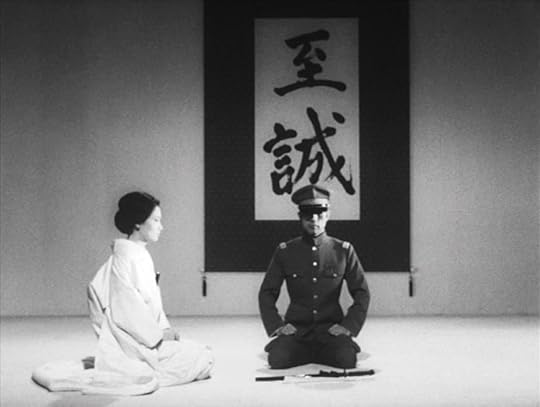What do you think?
Rate this book


326 pages, Paperback
First published February 15, 1953

“Reiko had not kept a diary and was now denied the pleasure of assiduously rereading her record of the happiness of the past few months and consigning each page to the fire as she did so.”
'Qu'on enfant se noie dans l'océan, cela peut de produire, et sans aucun doute tout le monde y croira. Mais que trois personnes à la fois se noient, c'était absurde. (...)
Une seule mort était grave et importante, comme l'était un million de morts. Ce qui était légèrement de trop avait un autre caractère.'
'La nuit était obscure et brumeuse, comme souvent au début de l'été à la saison des pluies. Les lumières au néon peignaient en riches couleurs le ciel bas. La délicate pagode qui sans fin s'illuminait, s'éteignait, s'illuminait de néons aux teintes pastel, était en vérité très belle. (...)'
'On respirait dans le restaurant une odeur particulièrement américaine, moitié d'hygiéniques désinfectants, moitié la douce et pénétrante odeur des corps. (...)
Malgré le bruit et l'agitation générale, il y avait quelque chose de solitaire dans chacune de ces femmes et dans leur appétit. De triste, de solitaire, comme l'action mécanique d'autant de machines à consommer.'
'Se concentrer, il s'en aperçut bientôt, lui faisait plus de mal que de bien. Il essaya donc ensuite de se calmer en se dispersant. Il était stupéfait que se concentrer eût pour effet paradoxal de l'enfoncer dans ses chimères; mais il constata vite qu'essayer la méthode contraire en dispersant sa pensée signifiait qu'en fait il acceptait les mêmes chimères.'
'Les quatre femmes débouchèrent avenue Showa, Koyumi en tête. Elles traversèrent un parking où beaucoup de taxis, leur journée finie, étaient garés. Le clair de lune se reflétait sur la carrosserie noire. On entendait crier les insectes. Il y avait encore beaucoup de circulation avenue Showa, mais la rue elle-même était endormie et le fracas des motocyclettes paraissait isolé et solitaire (...).'
'ils s'étaient, une fois de plus, sentis à l'abri derrière des murs d'acier que personne ne pourrait abattre, défendus par l'armure impénétrable du Beau et du Vrai. Si bien que loin de voir une source de contradiction ou de conflit entre les exigences de sa chair et la sincérité de son patriotisme, le lieutenant finissait même par y voir les deux aspects d'une même chose.'
'Ayez la bonté de regarder par ici. Nous avons ici quelque chose d'absolument unique, tant en Orient qu'en Occident, aux temps anciens ou aux temps modernes, une armoire dont le caractère transcende tout usage ordinaire. (...) Ce n'est pas tout à fait un court de tennis, mais il y a bien assez de place pour des exercices. Les quatre parois sont tapissées de miroirs et il y a aussi un éclairage électrique.'
' "(...) Je suis convaincu que la chose essentielle est la façon dont se conduit l'acteur [de kabuki] dans la vie réelle. " (...)
Le faire-semblant de sa vie quotidienne était le support du faire-semblant de ses représentations sur la scène. (...)
L'onnagata naît de l'union illégitime du rêve et de la réalité.'
'Elle avait l'impression que toute l'étrange attitude de Mme Kasuga, et ce procédé compliqué (se faire accompagner pour rendre la perle) cachaient quelque chose de beaucoup plus profond. Était-il concevable que Mme Azuma ait mis le doigt sur une faiblesse dans le caractère de son amie (...), et qu'en mettant ainsi son amie au pied du mur elle ait transformé une kleptomanie impulsive et inconsciente en profonde et inguérissable maladie mentale
'Elle ferma un instant les yeux et revit aussitôt devant elle le petit nouveau-né : il gisait sur le parquet, et son corps fragile était enveloppé de journaux tachés de sang.
Toshiko était sûre que le docteur l'avait fait exprès, par méchanceté. Comme pour souligner le mépris qu'il portait à cette fille-mère qui mettait au monde un bâtard dans des conditions aussi sordides'